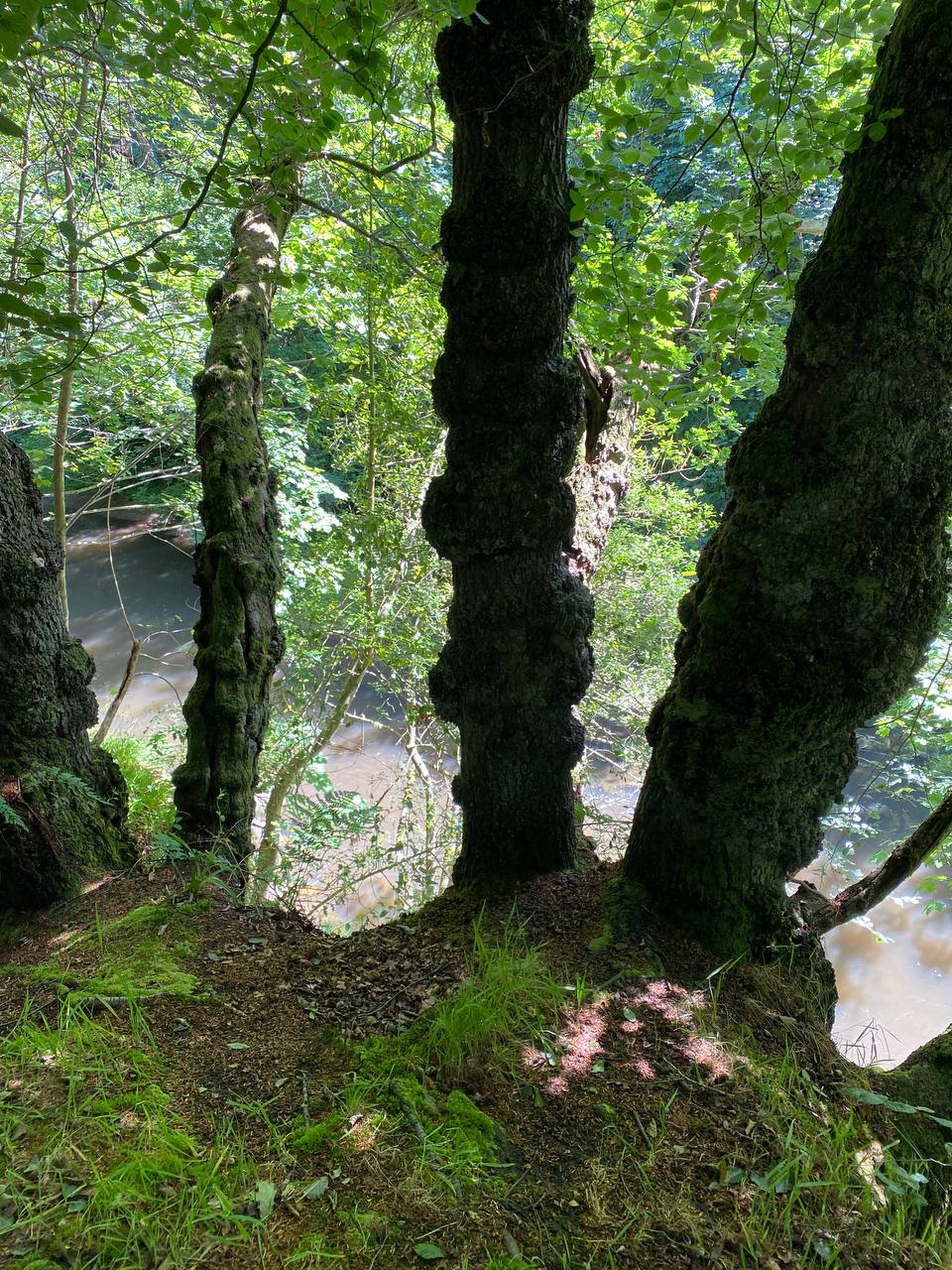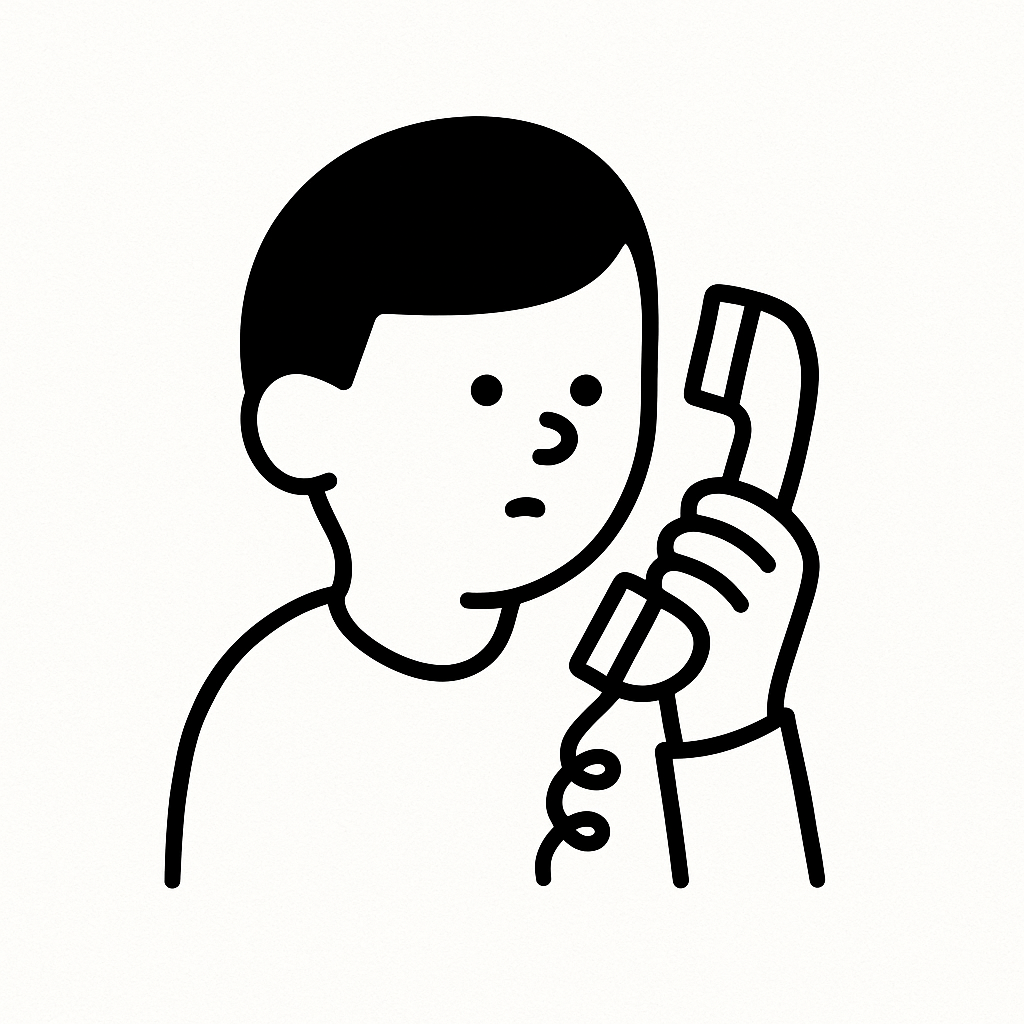#156
On ancient woods
This week we went mushroom hunting to a nearby glen with the largest surviving stretch of ancient woodland in the area, and while it was really beautiful (and occasionally challenging to navigate), we found precisely zero mushrooms.

It must've been the dry spell or overall heat to blame, but at least we made up for the disappointment by visiting a nearby chapel. Pictures inside were prohibited but the same chapel was featured in the final scenes of The Da Vinci Code film, so you've probably seen it already.
Back home I gave a try to making bibimbap from scratch. It's totally unconventional: the marinade has traces of kiwi and meat was grilled in the oven.

However, the flavours were spot on (partly because of the gochujang quantites I've added to both marinade and sauce):

The other day Sasha made lavash:

And I mixed some Adana kebabs:

Baking lavash requires lots of heat, which in case of ovens usually depends on electricity, so we barely made it through with both ovens turning off mid-way through cooking, but it was definitely worth the effort.

Next time I'll probably grind the meat myself to balance out the fat content.
Enjoying this? Get Tuesday Triage in your inbox every week.
Things I enjoyed reading
1. The End of the Magic World’s 50-Year Grudge by David Segal
This is a wonderful longread about the similarities between the works of one of the best magicians of the previous century, and modern technologies that make things look real too:
A mere handful of magicians have left anything close to this kind of imprint. If Mr. Geller can’t actually bend metal with his brain — and civility and fairness demands this “if” — he is the author of a benign charade, which is a pretty good definition of a magic trick. Small wonder that the anti-Geller brigade has laid down its arms and led a rapprochement with the working professionals of magic. He is a reminder that people thrill at the sense that they are either watching a miracle or getting bamboozled. And now that fakery is routinely weaponized online, Mr. Geller’s claims to superpowers seem almost innocent.
There is a museum dedicated to Geller in Israel, so once I visit the Holy Land I have to stop by.
2. On the Value of Not Reaching Your Goals by Simone Stolzoff
Probably the most important thing in goal setting is making sure the intrinsic motivation is right:
Not making The New York Times best-seller list provided me with an opportunity to interrogate the goal itself. There’s no silver lining my feelings away, but I can take a moment to recognize how far I have come. And even though dreaming a wildly ambitious dream might be a recipe for disappointment, I also feel an odd pleasure in knowing I gave it a shot.
The journey matters more than the destination and that's true for many things, including one's life.
3. Software engineers hate code by Dan Cowell
The author captures software engineering really well here: most engineers love writing about code, love reading about code, lover writing the code itself but hate dealing with and maintaining what they wrote.
Ever wondered why microservices took off in teams of all sizes? A microservice architecture is the perfect way to pretend that the code you wrote last month no longer exists! Now that it has been stuffed into a container and tucked behind a load balancer it's a service and we can forget all about it until it breaks, then we deprecate it as legacy and replace it with something new.
Over the years I learnt to enjoy the routine of maintaining code as well: it takes a different state of mind, but it could also be very rewarding as you get to work on things you never have time to implement in a fast-paced greenfield project.
4. Steve Mann: My “Augmediated” Life by Steve Mann
Steve Mann is a researcher famous partly for the Muse brain-sensing headband, which I wish to have in my collection of odd gadgets one day, but also as a person who spent more than three decades trying to perfect the wearable computing systems:
Because my computerized eyewear can augment the dark portions of what I'm viewing while diminishing the amount of light in the bright areas, I say that it provides a “mediated" version of reality. I began using this phrasing long before the rise in popularity of the more widespread term “ augmented reality," which usually refers to something less interesting: the overlay of text or graphics on top of your normal vision. That doesn't improve your eyesight. Indeed, it often makes it worse by obscuring your view with a lot of visual clutter.
Frankly I can't way for the world where there is no need to deal with physical screens anymore, partly because I keep adding scratches to my phone's screen by dropping it in the gym.
5. The Tyranny of the Tale by Parul Sehgal
I was taught to approach books as escapes to other worlds, not a metaphysical cage due to the narrative frame, and yet there is also a different perspective:
The memoirist’s binocular vision lets the reader experience the story from two points of view: the writer as character in the moment and as narrator after the fact. The narrating self, very often the adult self—who shapes story out of raw hunks of observation and partial understanding—is typically privileged, congratulated for its discernment and given all the good lines. But that unstoried self understands a great deal in its commotion, in its inability to keep anything compartmentalized, and it loses something when experience is squeezed to release trickles of insight.
I do agree that memoirs bring a very limited insight into one's life, but I find this constraint quite beautiful: as an author you can highlight or dim the right moments of your story and leave the details to yourself.
6. Leveling Up Job Interviews by Philipp Hauer
That's probably the best post on interviews I've read so far this year, and while it's quite generic, most of its key takeaways will work for any software-related position:
Another recommendation is to proactively ask questions during the interview, even if you are not directly asked to do that. You can flip questions. Some examples:
The interviewer asks you about testing approaches you have already used. You can flip that question by asking, “How do you do testing?”.
The interviewer asks you about your behavior in a conflict in a code review. You can ask, “Do you have conflicts frequently in your code reviews? Is this a likely situation?”.
On the highlighted point, not sure how I'd react as an interviewer as it breaks the interview structure, but it might as well lead to some interesting conversations.
7. The Psychedelic Scientist Who Sends Brains Back to Childhood by Rachel Nuwer
Seems like there is even more research on how to use drugs to enhance one's learning abilities, but there are caveats as well:
There is, of course, a catch. For mice, having a critical period open for too long causes neural disruptions. Some experts fear that, for people, carelessly flinging wide the doors of personal development could put the very core of their identity in jeopardy by erasing the habits and memories that make them them.
I know a few people who's obsession with "consciousness expansion" became more than an occasional dabble, and while so far they seem to be mostly getting the benefits of the process, I do hope it won't go terribly wrong.
8. The secret to Lee Valley Tools' business success by @susinsky
It's pretty nice to read articles about family-owned businesses that manage to stay on the market for half a century:
Still, it’s a delicate balance between solving problems and needing a tool for absolutely everything. While the serendipity of the product selection can be entertaining, it also begs the question: Does one really need tongs specifically for fishing toast out of the toaster? Or a paper plane launcher? Or a reflective sheet to warm your rear end while sitting around a campfire?
I've also really loved their gadjet to repel flies (a plastic dragonfly).
9. IKEA-oriented development by Taylor
I've seen many approaches to software development but this is a new one and it draws parallels between codebases and homes, programmers and homeowners, packaging and products.
In the computing world, screws are made of plaintext, HTTP, etc. Today’s shells and standard libraries offer ubiquitous screwdrivers like Regex manipulation, HTTP processing, and JSON parsing.
The author argues that as IKEA furniture is hackable and easily disposable, so should be the code too, and I definitely agree. Those things are not meant to stay the same for years and should be evolving with their owners.
10. The mathematical way to tie your shoes by Ethan Siegel
A wonderful way to wrap up the list: a mathematical perspective to tying shoelaces, thanks to the knot theory:
From a topological perspective, there are three steps that you take when you tie your shoes, and each step has a “choice” that you make. All told, there are eight possible outcomes: four of which give you a good (reef) knot and four of which give you a (bad) granny knot. Here’s how to mathematically tell which one you’re creating, as well as how to fix it if you’re doing it wrong.
And it links nicely with my last week's point on obtaining deep knowledge of subjects whenever it's possible, as you will never know when it could come handy.
Did you know I make apps?

Murmur
I used to avoid phone calls. Now I practice them first — job interviews, doctor appointments, that call to the bank you've been putting off.
Take a look →Things I didn't know last Tuesday
1. Ain Dubai
Apparently the world's largest Ferris wheel is in Dubai... but it doesn't work anymore and probably won't be ever again.
The Ain Dubai, with more steel than the Eiffel Tower and nearly twice as tall as the London Eye, was supposed to be closed for just a month. Then another month. And another. Finally, in April, operators quietly announced it would be closed indefinitely.

It's almost two times taller than the London Eye by the way.
2. Eating microwave popcorn increases the level of PFAS in body
I don't like popcorn but seeing how it could be made in a microwave always in a matter of minutes is fun. However it doesn't look like a good idea long-term:
Research suggests that people who regularly consume microwave popcorn have markedly higher levels of PFAS in their bodies. A study published in 2019 analyzed a decade of data about the eating habits of 10,000 people, which was collected by the Centers for Disease Control and Prevention between 2003 and 2014. Blood samples from the study participants were also collected. The researchers found that people who ate microwave popcorn every day over the course of a year had levels of PFAS that were up to 63% higher than average.
The PFAS are manmade chemicals that accumulate in the body and lead to lots of adverse health effects.
3. Q texture
Now I know what to say to describe the right noodle texture:
In Taiwan, Q is a culinary term for the ideal texture of many foods, such as noodles, boba, fish balls and fishcakes. Sometimes translated as 'chewy', the texture has been described as 'The Asian version of al-dente ... soft but not mushy.' Another translation is 'springy and bouncy.'
Looks like it also could be used in a doubled form, "QQ", which means the same but more intense.
4. Alexander Graham Bell's funeral
The Wikipedia article on Bell has lots of gems, but this one made me pause:
Upon the conclusion of Bell's funeral, for one minute at 6:25 p.m. Eastern Time, "every phone on the continent of North America was silenced in honor of the man who had given to mankind the means for direct communication at a distance"
I also just only recently realised that Bell was born in Edinburgh and spent some time here.
5. Ekhidna and ekhinos
I remember being very confused in my childhood when I learnt that a small spiny animal is named after a half-woman, half-snake from Greek mythology, that doesn't have any spines.
Unfortunately, the word ekhidna is very similar to the ekhinos (ἐχῖνος) which is the Ancient Greek word for hedgehog, and appears in the names echinoderm and echinacea because they have spines, giving rise to the misapprehension that the name echidna means spiny.

Looks like it's boiling down to a linguistic mistake then. Although I've seen a different version claming that the name is because in the past people thought the animal had qualities of both mammals and reptiles.
6. Geographic anagrams
If you take a word and rearrange its letters so it turns into a place name, then this is a geographic anagram, and for some reason that's quite common in English-speaking countries.
Sury Basin [anagram of Sainsbury], London, England – street in Kingston upon Thames and location of the town's Sainsbury's supermarket; first part is also a mis-spelling of Surrey, the town's traditional county
Out of all languages, the only other one with an article on geographic anagrams on Wikipedia is Urdu.
7. Glass Dresses
In the 19th century someone came up with an idea to wove spun glass fibers into silk (or anything else) to make dresses:
To “spin” these glass fibers, a glassworker used tweezers to pluck filament after filament from a rod dipped into a flame. These threads were often wound onto a wheel and then woven on hand looms, dressed with some organic fiber to cushion the fragile glass.
Looks like they weren't really practical so the trend never happened, but it's pretty cool that they were sturdy enough to wear.
8. The Vinaigrette
That's the first time I see the word "Vinaigrette" in such context:
Let’s rewind about 150 years when a vinaigrette once commonly referred to a small container for smelling salts or aromatic vinegar that were used to cover unpleasant smells.
The container would usually have a sponge soaked in vinegar or perfume to work.
9. Why roses smell nice?
Looks like the main factor might be pure coincidence:
Producing roses with smells that please people could not have been the reason for the success of this gene duplication and change by mutation. Why then did the new gene survive and succeed? It turns out to be bees: The important pollinators of roses seem to sense DMT.
But also I hardly understand most of the article as it's too technical and I am too lazy, so maybe I just missed something.
10. Soviet Union sold titanium to the US believing they needed it for pizza ovens
This one just cracked me up:
This was a pivotal moment between two great powers that desperately wanted to defeat the other. Ultimately, through third parties and fake companies, the US, “managed to unobtrusively purchase the base metal from one of the world’s leading exporters – the Soviet Union,” according to the book Skunk Works by Ben Rich, a Lockheed Martin engineer who worked on the SR-71. “The Russians never had an inkling of how they were actually contributing to the creation of the airplane being rushed into construction to spy on their homeland.”
I imagine how some comrades were talking about those weird Americans looking to build thousands of pizza ovens.
Book of the week
I picked up Lamorna Ash's Dark, Salt, Clear thinking that it's a yet another cookbook, but ended up reading this journey through the coast of Cornwall anyway, and as much as the author got surprised by how hard, unwelcoming and troubling the South of England could be:
I wake to my alarm at 4.30 a.m. Outside it is henting it down, one of many Cornish terms for rain. It sounds appropriately heavy and unpleasant enough to describe the thick black drops illuminated in patches by the dim street lamps along the Fradgan. It is silent here in a way that it is not at any hour in London. The alleys that run alongside the cobbled ways behind the Strand, picturesque at day with washing strung up from one side to the other, by night reform themselves into foreboding passages filled with crudely sketched-out ghosts, whose peg-stretched arms reach out to draw you into their darkness.
I am up before daybreak to meet James and Will, the two-man crew of Three Jays, a 35-foot crabber, on the pontoons. I imagine the other day-fishermen around town hitting their alarms and lying still for a few seconds, counting those last moments of respite before they face the long hours of work ahead of them. At last, with a sigh, they reach across the bed to kiss their wives on the foreheads, slip out of bed, pull on their work clothes, grab a coffee and packed lunches, and leave, noiselessly shutting the front door behind them.
It's worth mentioning that Cornwall I've briefly seen on the border with Dartmoor wasn't an idyllic place either, but at least in this book it only takes a week-long boat trip with a crew of local fishermen to get a glimpse into their world of proud and compassionate peoplle.
I guess in the end the book aims to show how those small communities are threatened by the globalisation, but personally I just went looking up fishing courses in the area as seems like that's just the best version of counselling and meditation simultaneously.
Thank you and see you in a week
(or in a month)!
If you'd like to support the newsletter, please subscribe to the weekly plan. Otherwise you will keep receiving the letters on a monthly cadence – no need to do anything to opt-in.
If you have any questions, or want to suggest a link for the next newsletter, please drop me a message on Twitter or reply to this email.
Cheers! 🍸
Need help with iOS?
I spent a decade on FDA-regulated medical devices and apps with millions of users. Now I help teams ship MVPs, rescue messy architectures, and build the hard bits that don't fit in a sprint.
Learn more →